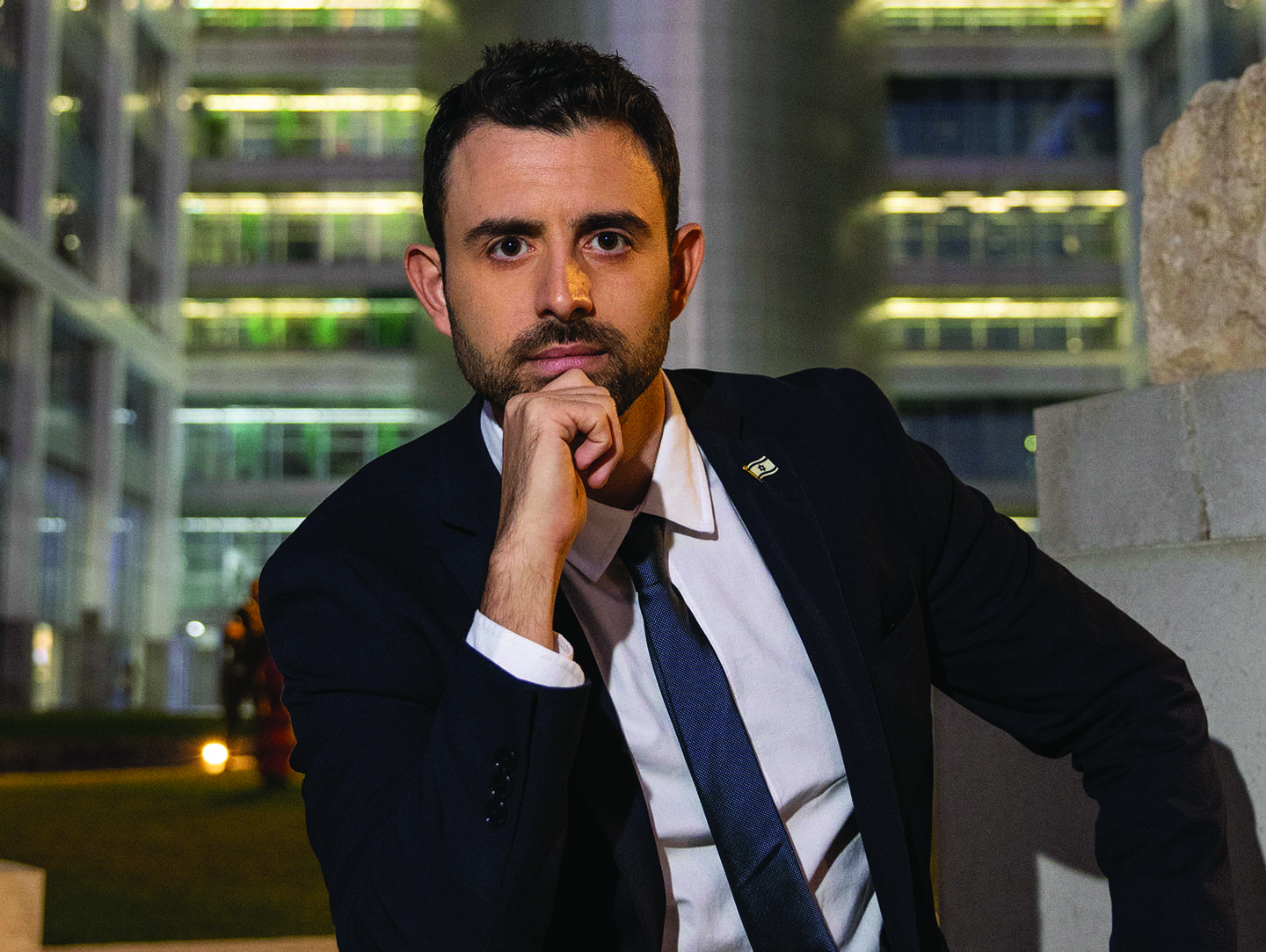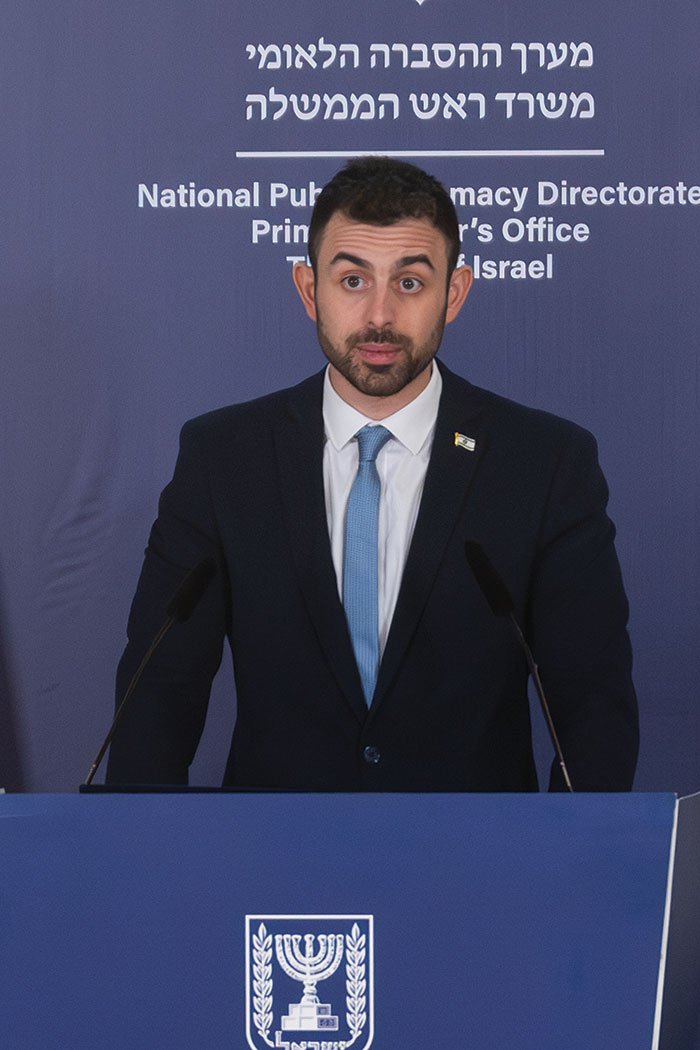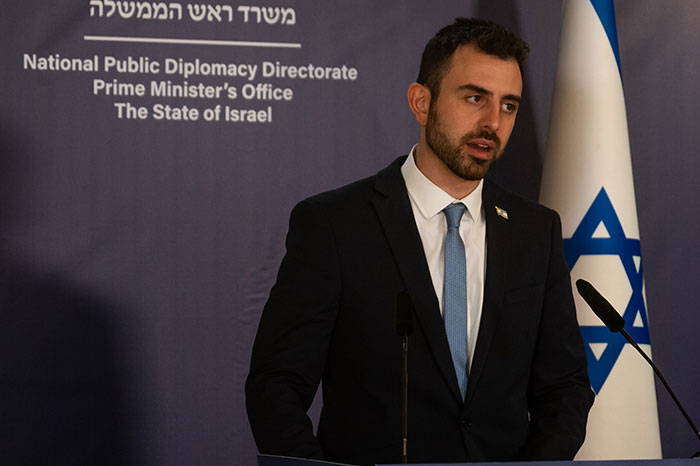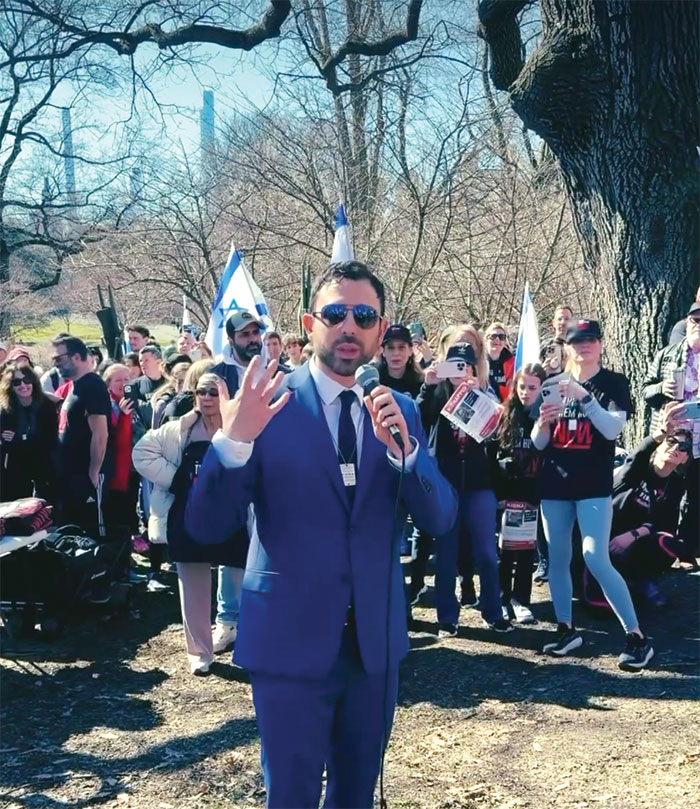 Photo by Adi Omi
Photo by Adi Omi Eylon Levy was sitting in the prime minister’s office with the Israeli flag behind him, answering questions about the hostage situation from reporter Kay Burley of Sky News. It was November of 2023, one month after the Israel-Gaza War began, and Levy talked about how he hoped the hostages would be returned soon.
The interview was pretty standard; Levy was a well-versed on-air personality at this point, having conducted hundreds of interviews as a spokesperson for Israel since Oct. 7. But then, Burley asked a question that stunned Levy.
“I was speaking to a hostage negotiator this morning, and he made the comparison between the 50 hostages that Hamas has promised to release as opposed to the 150 prisoners that are Palestinians that Israel has said it will release,” she said. “He made the comparison between the numbers and the fact that does Israel not think that Palestinian lives are valued as highly as Israeli lives?”

Levy raised his eyebrows in disbelief and paused for three seconds before answering: “That is an astonishing accusation. If we could release one prisoner for every one hostage, we would obviously do that. We are operating in horrific circumstances. We’re not choosing to release these prisoners who have blood on their hands. We are talking about people who have been convicted of stabbing and shooting attacks. Notice the question of proportionality doesn’t interest Palestinian supporters when they’re able to get more of their prisoners out, but really it is outrageous to suggest that the fact that we are willing to release prisoners who are convicted of terrorism offenses – more of them than we are getting our own innocent children back – somehow suggests that we don’t care about Palestinian lives? Really? That’s a disgusting accusation.”
And with that, Levy went viral. The video got hundreds of thousands of views, Sky News apologized for the blunder and the Jewish community proudly supported the PM’s most prominent spokesperson. There were also plenty of memes about Levy’s eyebrows going around – a silly moment during an otherwise tense time.
Before Oct. 7, Levy was more or less a private citizen; he had served as an adviser to President Isaac Herzog, and had media training through this work as a correspondent at i24NEWS and IBA English News in Israel.
“I had control of my time, and I was anonymous,” Levy told the Journal.
But when Oct. 7 happened, his life changed overnight. He set up his camera in his living room and started giving interviews to the press about that tragic day, articulating the facts and stating the truth while being a fierce supporter of the Jewish State.
Soon enough, Prime Minister Benjamin Netanyahu’s office noticed Levy and reached out, making him an official government spokesperson. His job? To give interviews to international media outlets day and night, rarely taking breaks, to present Israel’s case to the world and defend it from a tsunami of misinformation. After the Sky News interview, he was catapulted into stardom.
“Everything has been inverted in the months since Oct. 7,” Levy said. “I suddenly became very recognizable in Israel, especially after the eyebrows incident. It’s definitely a very stark change that is taking some getting used to.”
Since the start of the war, Levy has conducted an estimated 280 interviews, participated in press conferences and created informative, pro-Israel posts on social media.
“No two days looked the same,” he said. “At the peak of the war, I was giving 10 interviews a day as part of the team at the prime minister’s office. We were working around the clock in exhaustion. We couldn’t afford to abandon a single battlefield.”
While he doesn’t believe that the media in general is anti-Israel, their sources are clearly biased against the Jewish State.
There was so much propaganda that Levy had to combat, from lies about the “genocide” happening in Gaza to claims of ethnic cleansing and brutality used by IDF forces. While he doesn’t believe that the media in general is anti-Israel, their sources are clearly biased against the Jewish State.
“The problem is that the information landscape is anti-Israel,” he said. “You have the World Health Organization accusing Israel of attacking hospitals while covering up the fact that Hamas is waging war in those hospitals. You have U.N. relief agencies accusing Israel of restricting aid to Gaza to cover up the fact that they aren’t distributing it. The Red Cross is more interested in weaponizing international law against Israel than campaigning for the hostages. This means that even the best journalists are getting their information from actors who have, to put it bluntly, taken Hamas’ side during this war. Even journalists who aren’t hostile to Israel will look around and say, ‘Can someone with a U.N. logo on their business card be wrong? Can the whole world be wrong? Is Israel the only one that’s right?’”
There is also the difficulty of dispelling myths about the establishment of modern-day Israel.

“There is the lie that Israel is a settler colonialist state, as if this country of Iraqi and Tunisian refugees along with a few Holocaust survivors are the emissaries of some global empire to which they have no connection because, remember, Jesus was a Palestinian, right?” Levy said.
The exact opposite is true – Levy and Israel’s supporters know that – but Israel is outnumbered, so the myths live on.
“It’s very difficult for the Arab and Islamic world to look at this map of the Middle East and, in a sea of green, see this tiny little area where a downtrodden minority is standing up and demanding to be treated as equals.”
“Rep. Ritchie Torres [D-N.Y.] made this point that Zionism is the ultimate example of decolonization,” he said. “It’s the only story of people returning to their ancestral homeland and claiming independence, sovereignty and dignity in a region that was under imperial successor states. So obviously, we face this hostility. It’s very difficult for the Arab and Islamic world to look at this map of the Middle East and, in a sea of green, see this tiny little area where a downtrodden minority is standing up and demanding to be treated as equals.”
Levy, whose parents are Israeli with Iraqi roots, grew up in London. He called his hometown “a magnificent city with an incredible Jewish community,” where he didn’t experience any antisemitism as a child. His first encounter with it was in 2013, when British politician George Galloway stormed out of a debate at Oxford with Levy upon discovering that he was Israeli.
“I don’t debate with Israelis,” Galloway said. “I don’t recognize Israel and I don’t debate with Israelis.”
Eleven years ago, Levy, quoted in The Guardian, was just as eloquent and bold as he is now. “I am appalled that an MP would storm out of a debate with me for no reason other than my heritage,” he said. “To refuse to talk to someone just because of their nationality is pure racism, and totally unacceptable for a member of Parliament.”
The next year, Levy witnessed “a significant burst of antisemitism in the U.K.,” he said, when the 2014 Gaza War, Operation Protective Edge, began.
“It was something that troubled me greatly,” he said. “It’s very sad to think that what unfolded 10 years ago was only a prelude to what’s going on now.”
Seeing what Israel was going through, and wanting to help, Levy made aliyah, enlisted in the IDF and served as a coordinator of government activities in the territories. He wrote for The Times of Israel back in 2015 that he would “help Israel by helping the Palestinians,” and work on promoting the reconstruction of Gaza, advancing infrastructure projects and “exploring innovative solutions to bottlenecks preventing progress on issues of common interest to Israelis and Palestinians … Sometimes I felt like I was working for the Israeli branch of an international aid organization. But this is a real unit in the Israeli army, acting in clear accordance with the political directives of the democratically elected government.”
Once out of the IDF, Levy worked as a journalist and nonfiction book translator before his two-year stint with Herzog. And when the call came in after Oct. 7 from the PM’s office, he quickly became a social media sensation, with countless admirers in the Israeli and Diaspora Jewish communities.
It came as a shock, then, when news broke that Levy had been suspended from his position in late March. The Jerusalem Post reported that a clash with British Foreign Secretary David Cameron on X was the reason, while a Times of Israel article stated that Levy never received an official notice that he was being let go. Instead, he changed his social media profile to say Former Israeli Government Spokesman and subsequently resigned, tweeting, “You don’t need to be a spokesperson to speak up for Israel.”
Regarding his suspension, Levy said, “Israeli media has widely reported that the prime minister’s wife, Mrs. Netanyahu, was trying to get me fired because before the war, I participated in anti-government protests like half of Tel Aviv. According to media reports, this caused some consternation that someone who had been protesting the government a week before the war had then become the face of it in the international media. I have no inside knowledge or smoking gun, but that’s what Channel 12 said.”
Levy didn’t let this suspension stop him from publicly supporting Israel. Instead, he went right back to speaking on Israel’s behalf as a private citizen – though this time, he wasn’t so private anymore.
“My life is different now,” he said. “It’s become very weird. If you had told me back then that in a few months, I’d be stopped in the street everywhere I went, and people would ask me for selfies with my eyebrows, I’d have no idea what this meant or why this was happening.”
Before taking on his role as spokesperson, Levy had 230 followers on his Instagram. “Now, I have over 230,000 followers,” he said. “It’s a platform I’ll use to tell Israel’s story instead of posting pictures of breakfast, like I used to do.”
Following his suspension, Levy also started a podcast, “State of a Nation,” where he interviews pro-Israel voices like U.S. Rep. Ritchie Torres, Douglas Murray, Einat Wilf and Elon Gold.
“I’ll use the shockingly large platform I’ve somehow built over the last few months to continue getting the message out.”
“I’ve taken the volunteer team working with me since Oct. 7,” he said. “It’s an independent, international public diplomacy initiative – a civilian spokesperson office if you will. I will continue giving interviews and briefings and adapting materials for social media. I’ll use the shockingly large platform I’ve somehow built over the last few months to continue getting the message out.”
It’s work that needs to be done, in a time when social media as well as mainstream media are flooded with misconceptions about Israel. Some people may not have access to the truth behind the conflict, while others don’t care to find it out, because all they want to do is continue to push their bias. Case in point: the media in Ireland.
“The Irish media is irredeemable,” said Levy. “Their hostility towards Israel is informed by a mix of Catholic antisemitism together with a narrative around the conflict where they cast themselves as the Palestinians and the Israelis as the British settlers. They have such a profound identification with Palestinians that it’s difficult to make any headway with them.”
There is also Al Jazeera, which the Israeli government could temporarily shut down in Israel because it’s been deemed a security risk.
“Al Jazeera made up allegations of rape, which they retracted later,” said Levy. “The media also says that Israel is targeting civilians and using genocide. The sad fact is that Hamas knows that there is a sizable portion of international public opinion that is automatically primed to believe the worst about the Jews. They can say anything. I’m shocked they haven’t accused us of massacring the dinosaurs yet.”
Levy and those like him are fighting what he knows is a coordinated campaign against Israel.
“What is more disturbing is not to think of it as something coordinated – as if there are people sitting behind computers, sending out message sheets to activists around the world – but to understand the broader historical patterns this fits into,” he said. “What we are seeing now is the modern incarnation of antisemitism. As much as people may wish to deny or turn a blind eye to it, there is an increasing realization that this is the problem. Anti-Zionism and antisemitism are not separate phenomena.”
At a recent event for the Hillel International Israel Summit in Atlanta, Levy spoke about how Gen Z can become Gen Zionist and fight for the Jewish State, especially on college campuses, where antisemitism has been rampant.
“I told these students they need to stand up to the bullies and not let them push you around,” he said. “The most Zionist thing they can do is to stand up for Israel.”
”These students are coming under increasing abuse and intimidation on campus to the point where I call the other side pro-Hamas protesters. They don’t even show their faces. Jewish students fear their peers have turned on them, while academics are leading the charge and faculty has abandoned them.”
When Levy saw the reports about college campuses from afar and then visited the U.S., he said the situation was “much worse than I realized, and I thought I was following it closely,” he said. “These students are coming under increasing abuse and intimidation on campus to the point where I call the other side pro-Hamas protesters. They don’t even show their faces. Jewish students fear their peers have turned on them, while academics are leading the charge and faculty has abandoned them.”
There is also trouble brewing in London, with the frequent anti-Israel protests attended by thousands of people. Still, Levy won’t promote aliyah for the wrong reasons.
“The situation there is disturbing, but not existential,” Levy said. “Jews around the world who want to move to Israel because they want to should, and we’ll welcome them with open arms. If not, they should stand their ground and fight for their place in Western society. It’s their right. It’s not a lost cause. In order to have a safe and secure Jewish homeland, we need allies around the world. If everyone in the diaspora packed up and left, we wouldn’t live in a world that is safe for a Jewish State.”
For now, Levy will keep posting the truth on social media, giving interviews from Israel and recording his podcast. He’s currently crowdfunding for the show, which has a pledge from The Ministry of Diaspora Affairs to match donations up to a certain amount.
Even though it’s unpopular to advocate for Israel, Levy, who has faced a barrage of hate, encourages his fellow Jews to do it however they can.
“We need the whole Jewish world to speak up during this incredible diaspora awakening, to share facts and not let the lies go uncontested,” he said. “The future will be extremely, unimaginably bleak if large sections of society believe that Israel is guilty of genocide or starvation. We need to give people strength, courage and moral support, and remind them that they are on the right side of history.”
What gives Levy hope is that this start-up nation he chose to be a part of is tough and bravely defended themselves many times throughout history. The Iranian missile strike and threats of a bigger war with the Islamic Republic are coming to the forefront now, but he’s not worried about his country’s future.

“It’s important to remember, Iran has been attacking Israel every day since Oct. 7, and for decades before—through its proxies,” he said. “With its massive and unprecedented attack, Iran stopped hiding behind its proxies and stepped out of the shadows. People are anxious, but in any normal country, you’d expect reports of an imminent Iranian missile strike to spark riots and looting. Israelis are going on with their lives, because they know you can’t let the bullies disrupt normal life.”
Israel has gotten through worse, and they’ll get through this, too.
“The leader of Hezbollah once gave a speech comparing Israel to a spider’s web, saying that with a little pressure, we would snap and break,” he said. “But a spider’s silk has five times the strength of steel. Israeli society is tremendously resilient and dynamic and has a powerful source of strength that other countries only hope they could tap into.”
“We embrace life and live it. I am optimistic about the future of our country, and of our people.”
He continued, “We’re used to trying to find normality in the most abnormal circumstances. We embrace life and live it. I am optimistic about the future of our country, and of our people.”























 More news and opinions than at a Shabbat dinner, right in your inbox.
More news and opinions than at a Shabbat dinner, right in your inbox.